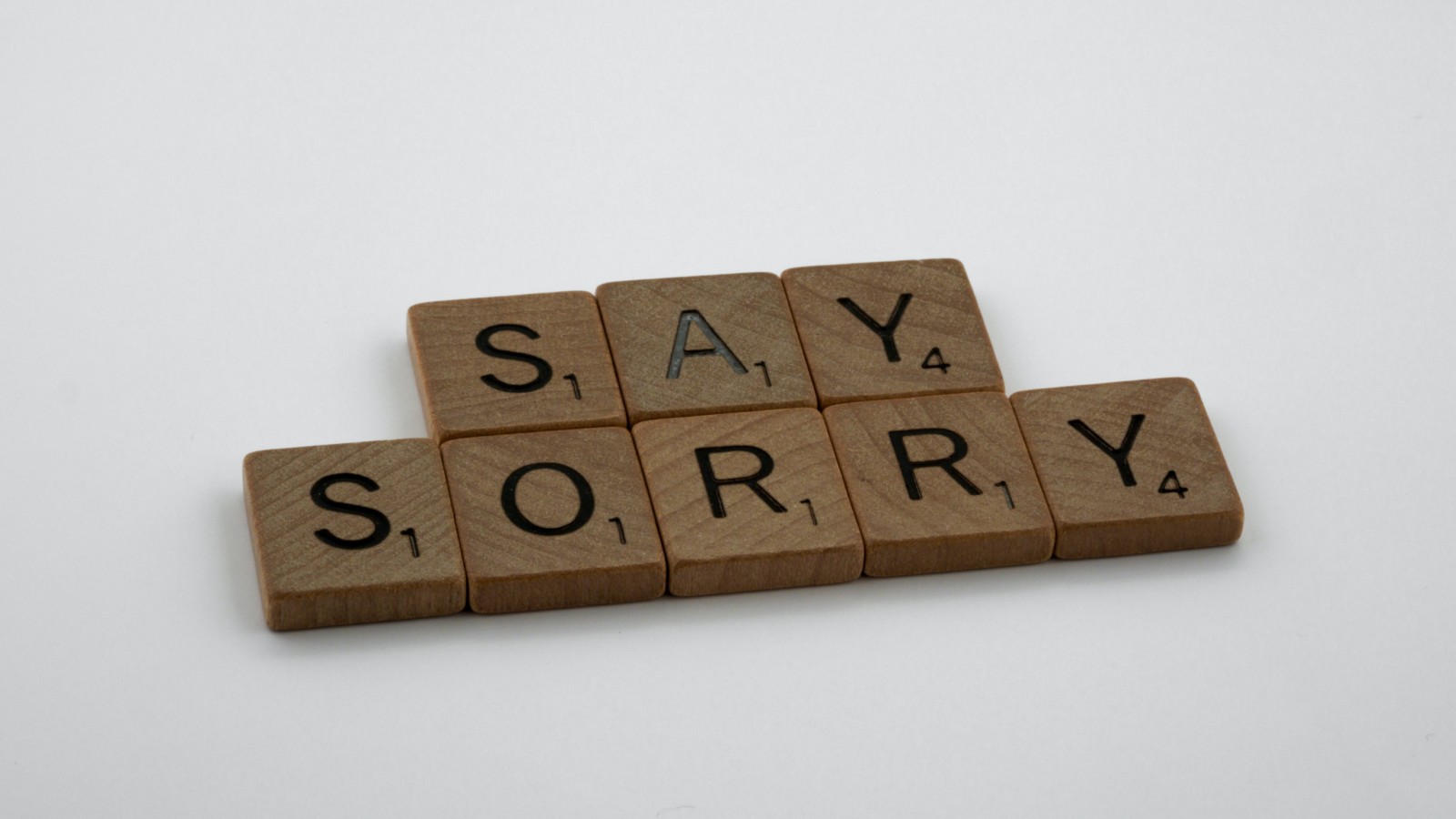Conflict resolution is a common discipline taught at management classes in world-renowned universities.
But in reality, most arguments can be avoided quickly with a short yet sincere “I’m sorry”.
Dodging apologies leads to a number of negative consequences in the long-term:
- It defeats the whole purpose of ownership – both in your personal life and professionally.
- Excuses tend to distort the way you perceive facts. Instead of looking at the culprit and solving the problem itself, you tend to justify your actions and hope for the storm to pass on its own.
- Lack of responsibility conveys apathy, and makes teamwork hard to bear. A team is as strong as its weakest unit, and being unable to trust and delegate to certain individuals impacts the entire culture.
Admitting your mistakes is a powerful skill that won’t diminish you as a human being – but instead, it will reveal honesty and integrity, critical traits to connect with your peers and reshape your life for the better.
Taking responsibility is a powerful skill. Let’s reveal the most impactful reasons you should own your mistakes more often.
1. You Learn From Your Mistakes
Perfectionism is a fallacy we’re taught at school.
The grading system revolves around achieving top scores for GPA, which is believed to be the path to success through a renowned university and a progressive corporate job.
Mistakes are bound to happen – the way we respond and react is what makes the difference.
By empowering the power of apologizing, you own the mistake, and spend the conscious time to reverse-engineer the problem to the very bottom. Regardless of whether something went south personally or at work, admitting the mistake followed by an honest “I’m sorry” will contribute to improving the way you behave and react in similar situations, reducing the odds of recurring caveats.
2. You Build Stronger Connections
Avoiding acceptance is a tendency that increases the gap between people.
When a conflict arises, a resolution is sought – which is achieved when the culprit is pinpointed and a conclusion is reached.
Dodging the mistake, pointing fingers, or even simply ignoring the problem leads to disappointment, uncertainty in acknowledging the mistake, and potentially causing a bigger conflict than needed. Moreover, this is likely to escalate over time – building up if the core problem hadn’t been paid attention to.
Owning the problem and taking responsibility has a powerful effect on building confidence in the relationship, turning a conflict into a reasonable argument.
3. You Stop Complaining All The Time
Failing to recognize your fault in a mistake inevitably points a finger elsewhere. Your significant other, a colleague, or your manager will indirectly be at fault instead.
The change of dynamics has a toll on the ongoing relationship.
On a subconscious level, you feel aggravated – disappointed, unfairly blamed, or thrown in a middle of a conflict you have nothing to do with.
Conversations become arguments that turn into conflicts, and ongoing conversations drift you apart additionally. You feel isolated or ignored by people who don’t feel they can get on the same page with you.
Learning the power to own your mistakes brings peace of mind, a better perspective on life, unlocking new opportunities and living a fulfilled life.
4. Arguments Become Civilized
Active listening is mandatory for conflict resolution.
Once you master the habit of not playing “hot potato” during the argument, but diving into the root of the problem, arguments become civilized discussions instead.
A conflict isn’t all about blame and pointing fingers. The main purpose of a heated conversation is establishing a problem and finding a solution, and owning the mistake when you are personally involved puts out the fire in no time.
If you find yourself getting into explosive conflicts on a regular basis, ask yourself whether taking responsibility isn’t the root of the problem. Try it several times and observe the consequences – you may very well find a new purpose in discussing challenges.
5. Mistakes Don’t Turn Into Disasters
If you refuse to take ownership of a mistake in any case, a conflict never gets resolved. It’s kicked under the rug and piled up with a number of following arguments.
Acting quickly on any problem prevents further consequences, reduces tension, and build positive energy.
If you have the tendency to detract blame and stay defensive, you increase the likelihood of heading into more heated arguments from the get-go or reiterating an old problem over and over again.
Learn to own mistakes quickly and you will find yourself putting fires off quickly, decreasing stress at home and work, and focusing on what truly matters.
6. You Spend More Quality Time
All things considered, resolving arguments in a civilized manner, preventing real fires through quick fixes, and quickly regrouping when a process is flawed will help you spend more quality time instead of dwelling on problems all over again.
- Your conflicts would not last forever, nor spark a bitter taste after a heated conversation.
- The overall energy with your family, significant other, or colleagues would be predominantly positive.
- Always reiterating conversations from the past would not be needed anymore.
You will enjoy a happier life, being fully content with yourself. Mistakes are not the end of the world as long as you own them up and convey the right message to the other party.
Put yourself in your partner’s shoes and imagine how relieved they will be once a problem is acknowledged and taken care of. Confident adults and great leaders are masters of ownership, and striving to become a better individual will benefit a ton from making the first step to your better self.


